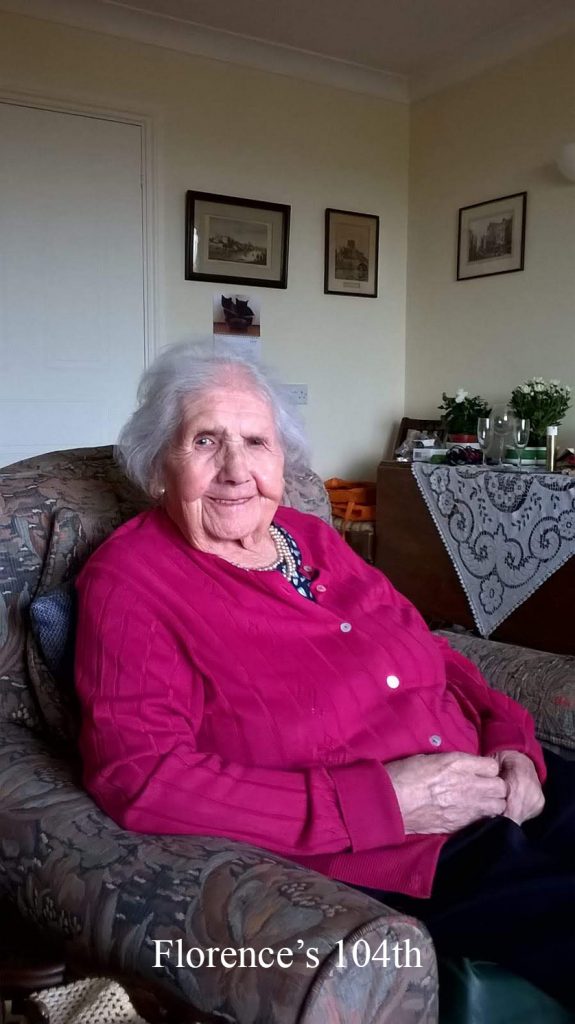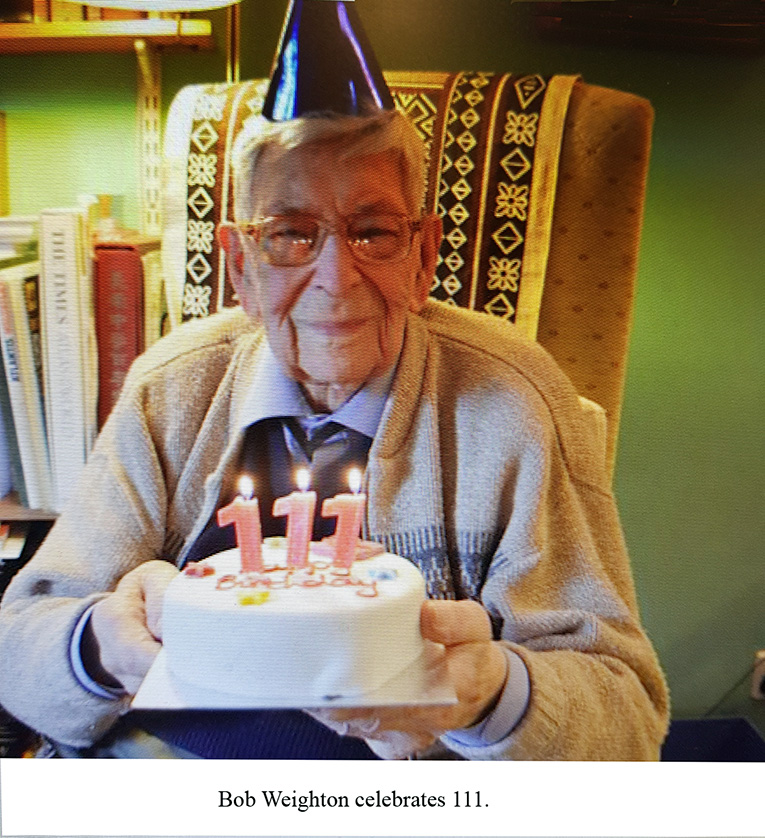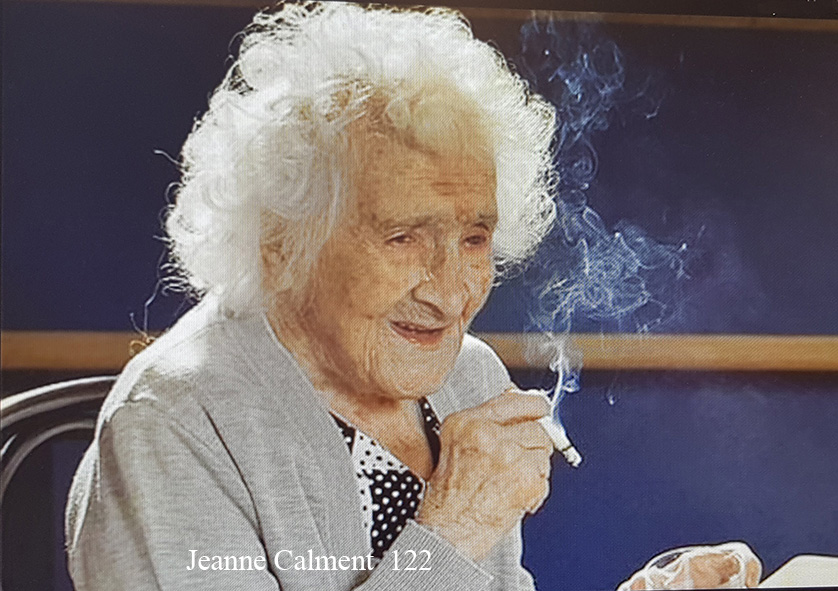Centenarians – 100 years old and counting
In March this year I saw an interview on TV as I expect loads of people did, of a wonderful old man of 111 years old called Bob Weighton. He was very sparky and full of life and was asked the inevitable question people always ask my mum Florence aged nearly 105 “what’s the secret of such a long life?”. “Well” said Bob very thoughtfully in answer to the question “there’s really only one secret of a long life – avoid dying”.

When I related this to Florence slowly so she really took it in, she looked at me in anticipation and laughed out loud when I gave her the punchline. Florence when asked the same thing as Bob, usually gives a sort of small sermon on eating a simple diet as a child and walking miles. Though long walks are something she has not done in about 70 years. When people ask me about her longevity, I usually say its perhaps due to a fairly optimistic, easy going personality and a small glass of whisky most days. She only began the whisky routine about 30 years ago after her husband my father died. He thought whisky was not a woman’s drink, so I like to think she’s making up for past deprivation.
In a report on the State of Ageing in 2019 it was stated that the number of households in the UK where the oldest person is 85 or over is increasing faster than any other age group. So, people in the UK and many other parts of the world are living longer than ever before.
Is this massively problematic and/or are we not making the most of opportunities offered by older people, as a recent report by the UK Government Office for Science suggested? I am sure that it’s probably both, at the present time. And, I’ll definitely return to many of these incredibly important concerns in Tell me again stories to come. However, for the moment I’m going to stick to centenarians and then come back to Florence and to Bob Weighton.
The Office for National Statistics estimates that the entire population of the UK is now (2019) well over 66 million. As part of that huge number in 2015 there were 14,570 centenarians. Plus, in 1985 there were 130 people in the UK aged over 105 years and by 2016 this had increased to 850 and these numbers are rising year on year. While very recently there has been a significant rise in the number of people over 90, the numbers over 100 have flattened out a bit. Another change has been that although women still outlive men in terms of overall numbers there are now more men reaching a big old age and the sex ratio is narrowing. Bob Weighton and another man from Perthshire Alf Smith, who is exactly the same age as Bob and shares a birthday with him (a bit spooky) are obvious examples of this last change.
It’s very difficult to get precise figures worldwide. Indeed it’s quite difficult to keep track of them even nationally. But in 2012 the United Nations estimated that there were 316,600 people of 100 years or older across the world. It seems important here to remember that we are most unlikely to be seeing a move towards large numbers of us living for ever. Centenarians are certainly not unheard of in ancient times. It’s helpful as well to remember that a huge part of the rise in the numbers of older people now is to do with the massive fall in the number of babies, children and young people dying in earlier times. Plus major improvements in nutrition and public health measures through the late 19thand the 20th century played a big part in that story too.
Centenarians are certainly a special population and gerontologists (that’s people, often doctors, who study the ageing process ) have identified a variety of positive things that might account for who manages to stay alive longest. These are things such as not smoking, small body size, good diet, regular exercise, avoidance of stress and worry, lifestyle, family support, and a positive attitude towards life.
Apparently according to the United Nations, the greatest concentration of centenarians tend to be found living in Japan, Bulgaria and Sardinia. It’s thought that this may be due to living a simple life with lifelong physical activity and the fact that people in the above three countries tend rather more to be relatively short and light-weight people (this of course may be changing ).
How does all this relate to Florence and to Bob Weighton?

I have no idea about Bob except that he worked as both an engineer and a teacher and at 111 he still does his own shopping and much of his cooking, which sounds as if he’s been and still is pretty active. Florence is relatively small and has always been of a fairly regular weight. She has always eaten pretty sensibly, according to the usual vegetables, fruit etc type of recommended intake. She did like to smoke one or two cigarettes in the evening when we were children; she said it was her way of relaxing. She certainly didn’t do massive amounts of exercise as an adult and avoided like the plague unnecessary activity in later life. But from the above suggestions for living a long life, her greatest assets may be that she has always had a pretty positive and optimistic approach to her life and that she’s never been a great worrier or a stressed out sort of person. This has changed a bit in the last year or so. As she has become less independent, she quite understandably seems to worry more about the small things, like curtains being closed the minute its dark, doors being closed to just the right extent and objects being put in the right place. It’s as if these are a proxy for the much bigger things changing in her life over which she has no control at all.
I remember that Florence’s own mother Annie, who lived to be 85 years old, would say over and over “I’m never going to make it through another winter” but I have rarely heard Florence utter much about the fact that she will die one day. And she’s certainly not enthusiastic if you try and raise any issues around it. Explaining why we might need to have a Lasting Power of Attorney document drawn up was difficult, but we managed it in the end. A funeral plan was a step too far.
There is a lot of scientific interest in living a long life, and certainly a lot of interest in those living to over 100 years. In fact the term centenarian – opens up a whole new scientific window.
Bob (and I hope he won’t mind me using his first name or his birthday photograph) is what’s sometimes called in scientific terms a supercentenarian. These are people aged 110 years and older. They are few in number but growing as a small but scientifically interesting group. There are the semi-supercentenarians a group of which Florence is now a part, that’s 104 – 110 years. Or just centenarians who are 100 – 104 years old, like the wonderful architect IM Pei who was born in China, studied in the US and who designed the Louvre Pyramid. He just recently died at the age of 102. Centenarians all three, but classified in different categories.
The scientific search for the secret of longer life brings us on to a quick look at ‘telomeres’ and the suggestion that maybe, supercentenarians, semi-super centenarians and regular centenarians may age more slowly because their telomeres remain at a more ‘youthful’ level.
This developing research on anti-ageing, of which the study of telomeres is a part, starts from the cells in our bodies. Our body cells contain chromosomes, which are made up of strands of DNA which are the carriers of key genetic information. Telomeres are found on the ends of chromosomes and are a bit like the plastic tips on shoelaces. They protect the chromosomes and effectively stop them fraying and hence shortening. Telomeres shorten as you get older and that causes the chomosomes to become more vulnerable and fragile. So in time you become less youthful. Your skin becomes less elastic, your hair thins, you have more wrinkles. You are wearing out.
In the centenarian group however, international research teams have suggested that the telomeres of very aged people may not have shortened quite so quickly. So, they tend to to wear out more slowly. Their longer telomeres have offered greater protection to their chomosomes.
So maybe Florence and certainly Bob have more durable telomeres, perhaps because of their genetic makeup and almost certainly due to environmental factors as well. Whatever processes are at work it seems we may be starting to recognise that you are only as young as your telomeres.
‘What age is the oldest person who ever lived?’ people often ask me. Perhaps trying to work out how near Florence is to that age.

Its always difficult to determine the answer to this one because ages have to be verifiable. In other words if there aren’t any public records of some sort, then you won’t be included in the figures. In recent times a Japanese man Jiroman Kimura who died in 2013 was recorded as being 116 years old. The very oldest person whose age was well-documented was a French woman called Jeanne Calment who was born in 1875 and died at age 122 years and 164 days in 1997.
Or did she really?
I knew quite a lot about Jeanne Calment as I’ve had an interest in longevity for a long time now.
She lived mainly in Arles in the South of France and became quite a celebrity and a national hero in her latter years. When I was writing this story I researched her a little, not least because I wondered if I had the spelling of her last name quite right. To my surprise (though it may not be a surprise in France or to gerontologists) I discovered a number of articles casting doubt on her age and on lots of other things about her. I was intrigued and read on. What emerged was a fascinating story, which may or may not be true and may or may not ever be proven. The story runs as follows…….
Jeanne Calment was certainly born in 1875 and had a daughter called Yvonne Calment. Yvonne was born in 1898 when Jeanne was 23 years old and she sadly died of pneumonia in 1934 at only 36 years of age. She died leaving a husband of 42, a young son and her mother Jeanne who was 59 years old.
But some recent research has suggested that Yvonne did not die in 1934. Rather, it was her mother Jeanne Calment (yes she of super-duper centenarian fame) who died, possibly of pneumonia, in 1934 at the age of 59. Jeanne was buried and her daughter Yvonne, so the new story suggests, then assumed her mother’s identity in order to avoid paying inheritance tax which would have been due on the death of her mother. The Calment family were quite wealthy (they owned a department store in Arles) and French inheritance tax at this time was very high.
The recent research points out that the political and economic disruptions of the 1930s in Europe plus the fact that the family may have spent some time outside of Arles in the 1930s, enabled the deception to be kept relatively secret. It is suggested that some local people probably knew, but were not minded to shop the Calments.
In the original story, Jeanne and her son-in-law, Yvonne’s husband and her grandson, Yvonne’s child, lived pretty much together after Yvonne’s apparent death. They all got along very well and Yvonne’s husband never remarried although he was only 42 at the time of the death (quite a lot seems to be made of this in the new story). Much of the documentation relating to Yvonne seems to have disappeared and the registration of her death was apparently not recorded by a qualified doctor. These factors are used as evidence to support the authenticity of the new story and both Jeanne’s son-in-law and grandson (who became quite an eminent physician but died relatively young in a car accident) had died before her death in 1997, so following up those links was difficult.
So was it really Yvonne Calment rather than Jeanne Calment who died in 1997 and who would therefore have been 99 years old rather than 122? It certainly was claimed that Jeanne looked remarkably youthful for her age through at least her early centenarian period.
It was suggested that when Jeanne died in 1997 some of the officials involved with the documentation process to verify her age did have suspicions. But by then Jeanne really was a national star, so nothing was said. According to records Jeanne had not initially sought out publicity at all. For example, there was very little celebration or record of her 100th birthday. Though of course there is nothing inherently odd about that. One of the things I like about the story – and I found this quote before I read the research claiming the story was fake, was that when Jeanne was asked what her secret of living to such an old age was, she said:
‘Always keep your smile. That’s how I explain my long life’.
I found that quote alongside a photograph of her in later life puffing away at a cigarette. Sadly I don’t have the photo here, but she does sound pretty fabulous whatever age she was.
Of course there are established gerontologists who absolutely reject this new research and the new claim and who firmly continue to declare that Jeanne Calment was 122 years old when she died. But what an intriguing story and it demonstrates to me, the continuing fascination with longevity and the mysteries that studying it may reveal. So, good on you Jeanne, Florence and Bob too.